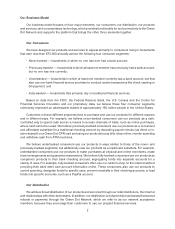Green Dot 2010 Annual Report Download - page 21
Download and view the complete annual report
Please find page 21 of the 2010 Green Dot annual report below. You can navigate through the pages in the report by either clicking on the pages listed below, or by using the keyword search tool below to find specific information within the annual report.Escheatment Laws
Unclaimed property laws of every U.S. jurisdiction require that we track certain information on our card
products and services and that, if customer funds are unclaimed at the end of an applicable statutory
abandonment period, the proceeds of the unclaimed property be remitted to the appropriate jurisdiction.
We have agreed with the banks that issue our cards to manage escheatment law compliance with respect
to our card products and services and have an ongoing program to comply with those laws. Statutory
abandonment periods applicable to our card products and services typically range from three to seven
years.
Privacy and Information Safeguard Laws
In the ordinary course of our business, we collect certain types of data, which subjects us to certain
privacy and information security laws in the United States, including, for example, the Gramm-Leach-Bliley
Act of 1999, or the GLB Act, and other laws or rules designed to regulate consumer information and
mitigate identity theft. We are also subject to privacy laws of various states. These state and federal laws
impose obligations with respect to the collection, processing, storage, disposal, use and disclosure of
personal information, and require that financial institutions have in place policies regarding information
privacy and security. In addition, under federal and certain state financial privacy laws, we must provide
notice to consumers of our policies and practices for sharing nonpublic information with third parties,
provide advance notice of any changes to our policies and, with limited exceptions, give consumers the
right to prevent use of their nonpublic personal information and disclosure of it to unaffiliated third parties.
Certain state laws may, in some circumstances, require us to notify affected individuals of security
breaches of computer databases that contain their personal information. These laws may also require us
to notify state law enforcement, regulators or consumer reporting agencies in the event of a data breach,
as well as businesses and governmental agencies that own data. In order to comply with the privacy and
information safeguard laws, we have confidentiality/information security standards and procedures in
place for our business activities and with network acceptance members and our third-party vendors and
service providers. Privacy and information security laws evolve regularly, requiring us to adjust our
compliance program on an ongoing basis and presenting compliance challenges.
Bank Regulations
All of the GPR cards that we provide and the Walmart gift cards we service are issued by either a
federally- or state-chartered bank. Thus, we are subject to the oversight of the regulators for, and certain
laws applicable to, these card issuing banks. These banking laws require us, as a servicer to the banks that
issue our cards, among other things, to undertake compliance actions similar to those described under “—
Anti-Money Laundering Laws” above and to comply with the privacy regulations promulgated under the
GLB Act as discussed under “— Privacy and Information Safeguard Laws” above.
In addition, in February 2010, we entered into a definitive agreement to acquire a bank holding
company and its subsidiary commercial bank, and filed applications with the appropriate federal and state
regulators seeking approval for this transaction. Should we complete our proposed bank acquisition, we
will become a bank holding company as provided in the Bank Holding Company Act of 1956, or the BHC
Act. Bank holding companies and banks are subject to supervision by the Federal Reserve Board and are
extensively regulated under federal and state laws. In general, this supervision and regulation will increase
our compliance costs and other expenses, as we and our proposed subsidiary bank will be required to
undergo regular on-site examinations and to comply with additional reporting requirements. In addition,
bank holding companies are subject to certain restrictions on their business and activities, although we do
not believe our current or currently proposed business will be restricted materially, if at all, by these
restrictions.
Activities. Federal laws restrict the types of activities in which bank holding companies may engage,
and subject them to a range of supervisory requirements, including regulatory enforcement actions for
violations of laws and policies. Bank holding companies may engage in the business of banking and
12
























